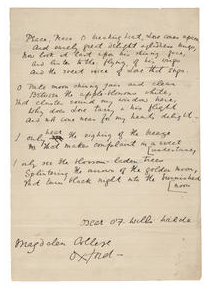
A hand-written work by Oscar Wilde sold for over £60,000 yesterday at an auction at Bonhams. The poem ‘Heart’s Yearnings’ was signed Oscar O’F Wilde, a signature that Wilde stopped using in 1876. The poem can be dated to 1873-4 and includes revisions in his own hand. It is thought that this is the earliest extant Wilde poem and was unpublished during Wilde’s life.

Oscar Wilde handwritten poem © Bonhams
The sale also included works by Sassoon, Yeats, Plath, Larkin and Rossetti. The draft of Sassoon’s war poem, ‘Atrocities’ showed how he toned down the imagery before final publication. Sylvia Plath’s work had not been seen at auction before and her working papers for ‘Sheep in Fog’ made £37,000. Edward Lear’s final nonsense poem ‘Some incidents in the life of my Uncle Arly’ sold for £10,000. If you weren’t the lucky purchaser here is the poem in full, although not in the poet’s own fair hand. It doesn’t seem to make any sense…
I
O! My aged Uncle Arly!
Sitting on a heap of Barley
Thro’ the silent hours of night,–
Close beside a leafy thicket:–
On his nose there was a Cricket,–
In his hat a Railway-Ticket;–
(But his shoes were far too tight.)
II
Long ago, in youth, he squander’d
All his goods away, and wander’d
To the Tiniskoop-hills afar.
There on golden sunsets blazing,
Every morning found him gazing,–
Singing — “Orb! you’re quite amazing!
How I wonder what you are!”
III
Like the ancient Medes and Persians,
Always by his own exertions
He subsisted on those hills;–
Whiles, — by teaching children spelling,–
Or at times by merely yelling,–
Or at intervals by selling
“Propter’s Nicodemus Pills.”
IV
Later, in his morning rambles
He perceived the moving brambles–
Something square and white disclose;–
“Twas a First-class Railway Ticket;
But, on stooping down to pick it
Off the ground, — a pea-green Cricket
settled on my uncle’s Nose.
V
Never — never more, — Oh! never,
Did that Cricket leave him ever,–
Dawn or evening, day or night;–
Clinging as a constant treasure,–
Chirping with a cheerious measure,–
Wholly to my uncle’s pleasure
(Though his shoes were far too tight.)
VI
So for three-and-forty winters,
Till his shoes were worn to splinters,
All those hills he wander’d o’er,–
Sometimes silent; — sometimes yelling;–
Till he came to Borley-Melling,
Near his old ancestral dwelling;–
(But his shoes were far too tight.)
VII
On a little heap of Barley
Died my aged uncle Arly,
And they buried him one night;–
Close beside the leafy thicket;–
There, — his hat and Railway-Ticket;–
There, — his ever-faithful Cricket;–
(But his shoes were far too tight.)

Leave a Reply